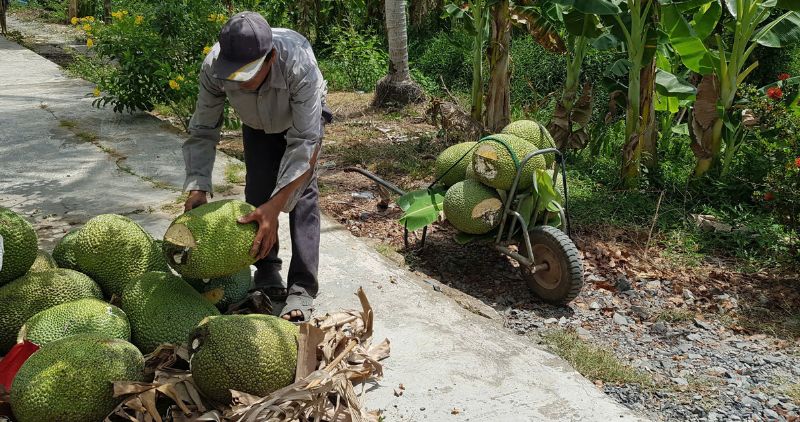Recorded in Tich Thien commune, Tra On district, many Java shrimp gardens are entering the peak harvest period, but the sharp decrease in selling prices has made farmers feel heartbroken.
Mr. Nguyen Van Lam, a household growing more than 6 hectares of ruoi, said that less than a month ago, he sold it for 22,000 VND/kg, but now traders only buy it for 14,00015,000 VND/kg.
"Except for all the care, medicine distribution, hiring workers to pick, it is considered a waste. Even some households have just enough to break even after collecting the capital, Mr. Lam added.
Not only rambutan, many other fruits such as Taiwanese guava, Thai jackfruit, and red-fleshed jackfruit are also being discounted at a steady rate.

Ms. Nguyen Thi Cam, a jackfruit farmer, said that jackfruit is full in the garden and no one comes to buy it, traders are used to cutting a very small quantity to keep the match. Last year, the price of Thai jackfruit was once up to 25,00030,000 VND/kg, now it is only 1,0001,500 VND.
"Red-fleshed tarpaulins are even better but have also dropped to 5,00011,000 VND. My family leaves it like that, I don't dare hire anyone to cut it, the more I pick it, the more I lose it," Ms. Cam added.
According to Mr. Tran Quoc Tuan (Vinh Long City), traders specializing in purchasing fruits in the Tra On area, the reason for the price decrease is that the supply from large growing areas such as Long Khanh (Dong Nai) is in the main crop, pushing the market into a surplus situation.
"Currently, my vehicles are running on several routes but are only collected sparingly. Binh chom or jackfruit that is collected and transported to the unit markets in Ho Chi Minh City is also difficult to sell, because every place is full," Mr. Tuan added.
According to statistics, the whole district of Tra On currently has about 330 hectares of ruoi, 320 hectares of Thai jackfruit and nearly 40 hectares of other jackfruit. With large output but lacking stable consumption linkages, people are facing great risk in prices.
In this situation, the local agricultural sector recommends that farmers be cautious in replanting crops, consider market demand and diversify crops, link up cooperatives and cooperatives to proactively produce.











